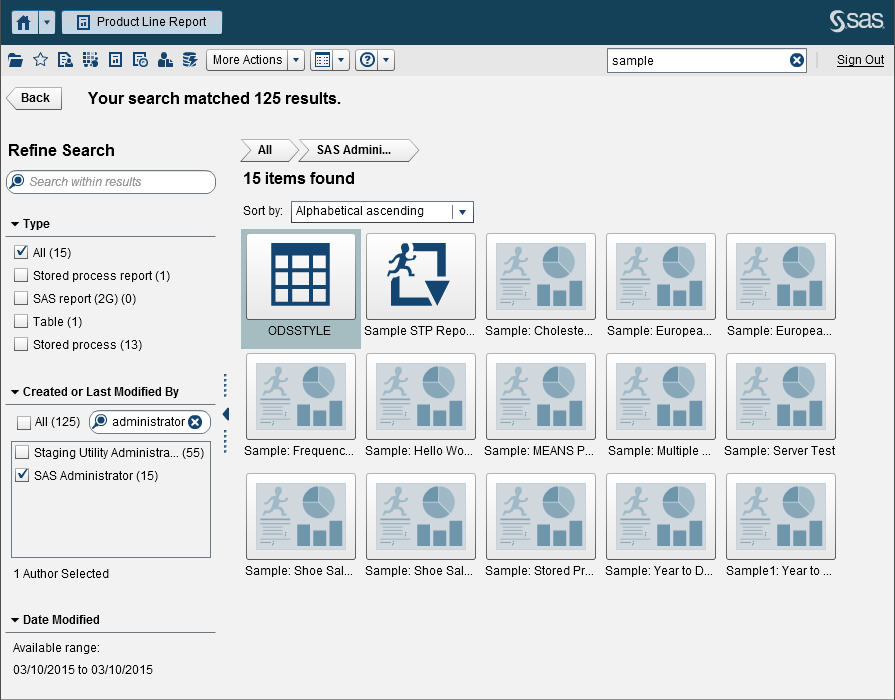About Searching from the Classic Home Page
You can search all reports, explorations, stored processes, stored process reports, tables, and queries that are on the metadata server from the menu bar on the classic home page. The list of items that you can search for depends on the SAS products that your
site has licensed.
Note: There can be a delay between
the time that an object (for example, a report or an exploration)
is created or changed and when the search is updated.
The following fields in metadata are searched:
-
Comment Title
-
Comment Description
-
Created
-
Description
-
Keywords
-
Last Modified
-
Title
The search field on
the menu bar supports the following types of searches:
-
single word
-
multiple word
-
in-word wildcardsNote: A wildcard search has a limit of 200 words.Use the asterisk (*) to represent possible characters in a particular position in a word to generalize the word or to make it easier to find in a search. For example, if you specify “cat*”, then the search matches any word with the prefix cat, such as cats, category, catfish, and so on.
-
spaces in strings that use quotation marks indicate that the words are considered together as a phrase for the search. For example, suppose that you search for "Sample Report”. The search matches Sample Report 1 and A Sample Report, but not Sample Values Report or Sample-Report.
-
the AND operatorFor example, if you specify “A AND B”, then only documents that contain both A and B are returned.
-
plus (+) and minus (-) syntaxThe plus (+) sign and minus (-) sign are prefix operators. This means that the operator precedes the search term that is required or excluded, rather than following it. For example:
-
Specifying
2012 2013 2014matches documents that contain any of the three terms. -
Specifying
+2012 +2013 +2014matches only documents that contain all three terms. -
Specifying
2012 2013 -2014matches documents that contain2012or2013, but only if they do not contain2014.
-
Here are some considerations for searching from the classic home page:
-
Single- and multiple-word searches that are plain text have a wildcard appended to them. For example, if you search for the word sample, then it is converted to sample*. This means that you get different results than if you entered “sample”, +sample, or *sample*.
-
The search is not case sensitive.
-
Up to 5000 items can be returned in a single search. If your search results exceed 5000 items, then the first 5000 items appear, and a message is displayed at the top of the Search Results window. The message tells you how many results matched your search and how many have been displayed. Narrowing your search using the search field enables the relevant search results to be displayed. When you submit a new search that returns fewer than 5000 items, you can see all the search results.
-
Search results on the classic home page are not ranked. In the workspace, you can use the Sort by drop-down list to specify that you want the list of items to sort by Alphabetical ascending, Alphabetical descending, Date ascending, or Date descending. The default is Alphabetical ascending.
-
A search string must be shorter than 4,000 characters.
Copyright © SAS Institute Inc. All rights reserved.
